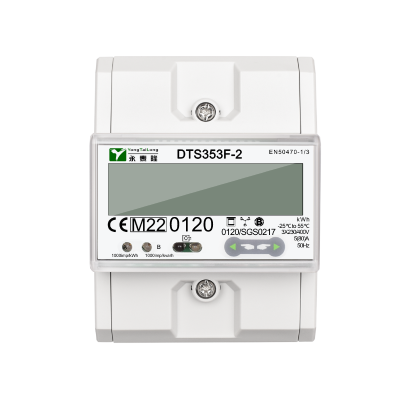As the world transitions towards a more sustainable and energy-efficient future, so full-smart meters has become increasingly prevalent.
In particular,
three-phase smart meters play a crucial role in managing electricity consumption in industrial, commercial, and large residential settings. However, choosing the right three-phase smart meter requires careful consideration of several factors. In this article, we will explore the key aspects to keep in mind when selecting a three-phase smart meter for your specific needs.

1. Accuracy and Precision:
One of the primary factors to consider when choosing a three-phase smart meter is its accuracy and precision in measuring electricity consumption. Ensure that the meter adheres to relevant industry standards and certifications to guarantee reliable and consistent readings. Accurate data is essential for effective energy management and billing purposes.
2. Communication Protocols:
Smart meters rely on communication protocols to transmit data between the meter and the utility provider. It is important to choose a three-phase smart meter that supports commonly used communication protocols such as Zigbee, Wi-Fi, or cellular networks. Compatibility with existing infrastructure and the utility's preferred communication network is crucial for seamless integration and efficient data transfer.
3. Data Management and Analytics:
The ability to collect, store, and analyze data is a vital aspect of three-phase smart meters. Consider whether the meter provides robust data management capabilities, including real-time monitoring, historical data retrieval, and advanced analytics. These features enable businesses and consumers to gain insights into their energy consumption patterns, identify areas for improvement, and make informed decisions to optimize energy usage.
4. Load Monitoring and Management:
In industrial and commercial settings, managing loads efficiently is critical for avoiding power outages and optimizing energy usage. Look for a three-phase smart meter that offers load monitoring and management features, allowing you to track individual equipment or circuits, identify energy-intensive devices, and implement load balancing strategies to reduce peak demand and associated costs.
5. Integration with Renewable Energy Sources:
As renewable energy sources gain popularity, it is essential to choose a three-phase smart meter that supports integration with solar panels, wind turbines, or other renewable energy systems. This integration enables accurate monitoring of energy generation, net metering, and the potential for selling excess energy back to the grid. Ensure the meter is compatible with relevant standards and protocols, such as the Modbus or SunSpec Alliance standards.
6. Security and Privacy:
Given the sensitive nature of energy consumption data, security and privacy should be key considerations when selecting a three-phase smart meter. Look for meters that implement robust security measures, including encryption, authentication protocols, and secure data transmission. Additionally, ensure that the meter complies with privacy regulations to protect consumer information.
7. Scalability and Future-Proofing:
Investing in a three-phase smart meter is a long-term commitment, so it is crucial to consider its scalability and future-proofing capabilities. Assess whether the meter can accommodate future upgrades, support additional functionalities, or integrate with emerging technologies. Choosing a flexible and adaptable meter ensures that your investment will remain relevant and useful as technology continues to evolve.
8. Supplier Support and Reliability:
Evaluate the reputation and reliability of the meter's manufacturer or supplier. Consider factors such as product warranties, customer support, and the availability of software updates. A reliable supplier will not only provide high-quality products but also offer ongoing technical assistance and ensure that the meter remains up to date with the latest industry standards and regulations.
When choosing a three-phase full smart meters, it is essential to consider various factors such as accuracy, communication protocols, data management capabilities, load monitoring, integration with renewable energy sources, security, scalability, and supplier support. By carefully evaluating these aspects, you can select a three-phase full smart meters that best suits your energy monitoring and management needs, enabling you to optimize


 English
English 简体中文
简体中文








.png?imageView2/2/w/500/h/500/format/png/q/100)





